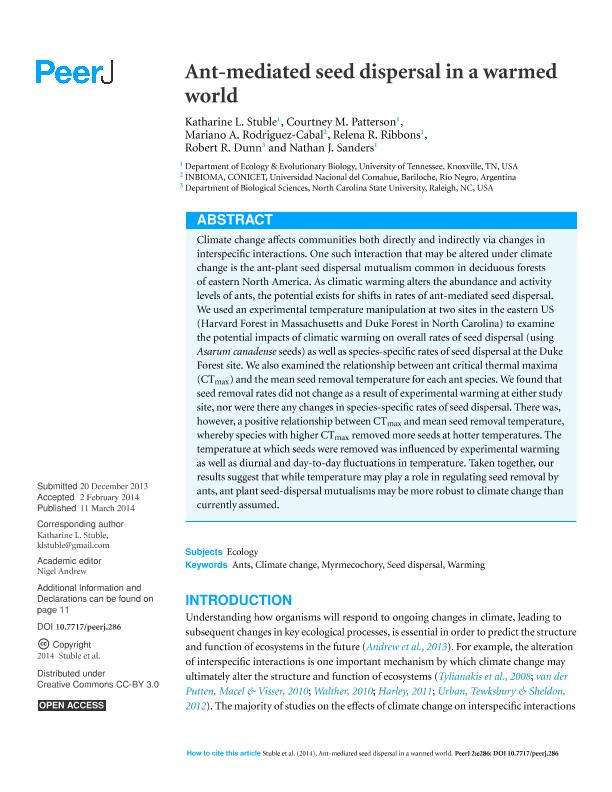Mostrar el registro sencillo del ítem
dc.contributor.author
Stuble, Katharine L.
dc.contributor.author
Patterson, Courtney M.
dc.contributor.author
Rodriguez Cabal, Mariano Alberto

dc.contributor.author
Ribbons, Relena R.
dc.contributor.author
Dunn, Robert R.
dc.contributor.author
Sanders, Nathan J.
dc.date.available
2017-01-25T19:22:42Z
dc.date.issued
2014-03
dc.identifier.citation
Stuble, Katharine L.; Patterson, Courtney M.; Rodriguez Cabal, Mariano Alberto; Ribbons, Relena R.; Dunn, Robert R.; et al.; Ant-mediated seed dispersal in a warmed world; PeerJ; PeerJ; 2; e286; 3-2014; 1-15
dc.identifier.issn
2167-8359
dc.identifier.uri
http://hdl.handle.net/11336/11906
dc.description.abstract
Climate change affects communities both directly and indirectly via changes in interspecific interactions. One such interaction that may be altered under climate change is the ant-plant seed dispersal mutualism common in deciduous forests of eastern North America. As climatic warming alters the abundance and activity levels of ants, the potential exists for shifts in rates of ant-mediated seed dispersal. We used an experimental temperature manipulation at two sites in the eastern US (Harvard Forest in Massachusetts and Duke Forest in North Carolina) to examine the potential impacts of climatic warming on overall rates of seed dispersal (using Asarum canadense seeds) as well as species-specific rates of seed dispersal at the Duke Forest site. We also examined the relationship between ant critical thermal maxima (CTmax) and the mean seed removal temperature for each ant species. We found that seed removal rates did not change as a result of experimental warming at either study site, nor were there any changes in species-specific rates of seed dispersal. There was, however, a positive relationship between CTmax and mean seed removal temperature, whereby species with higher CTmax removed more seeds at hotter temperatures. The temperature at which seeds were removed was influenced by experimental warming as well as diurnal and day-to-day fluctuations in temperature. Taken together, our results suggest that while temperature may play a role in regulating seed removal by ants, ant plant seed-dispersal mutualisms may be more robust to climate change than currently assumed.
dc.format
application/pdf
dc.language.iso
eng
dc.publisher
PeerJ
dc.rights
info:eu-repo/semantics/openAccess
dc.rights.uri
https://creativecommons.org/licenses/by/2.5/ar/
dc.subject
Ants,
dc.subject
Climate Change
dc.subject
Myrmecochory
dc.subject
Seed Dispersal
dc.subject.classification
Ecología

dc.subject.classification
Ciencias Biológicas

dc.subject.classification
CIENCIAS NATURALES Y EXACTAS

dc.title
Ant-mediated seed dispersal in a warmed world
dc.type
info:eu-repo/semantics/article
dc.type
info:ar-repo/semantics/artículo
dc.type
info:eu-repo/semantics/publishedVersion
dc.date.updated
2016-12-12T14:21:46Z
dc.journal.volume
2
dc.journal.number
e286
dc.journal.pagination
1-15
dc.journal.pais
Estados Unidos

dc.description.fil
Fil: Stuble, Katharine L.. University Of Tennessee; Estados Unidos
dc.description.fil
Fil: Patterson, Courtney M.. University Of Tennessee; Estados Unidos
dc.description.fil
Fil: Rodriguez Cabal, Mariano Alberto. Consejo Nacional de Investigaciones Científicas y Técnicas. Centro Científico Tecnológico Patagonia Norte. Instituto de Investigación En Biodiversidad y Medioambiente; Argentina. Universidad Nacional del Comahue; Argentina
dc.description.fil
Fil: Ribbons, Relena R.. University Of Tennessee; Estados Unidos
dc.description.fil
Fil: Dunn, Robert R.. North Carolina State University; Estados Unidos
dc.description.fil
Fil: Sanders, Nathan J.. University Of Tennessee; Estados Unidos
dc.journal.title
PeerJ
dc.relation.alternativeid
info:eu-repo/semantics/altIdentifier/url/https://peerj.com/articles/286/
dc.relation.alternativeid
info:eu-repo/semantics/altIdentifier/doi/https://doi.org/10.7717/peerj.286
Archivos asociados
